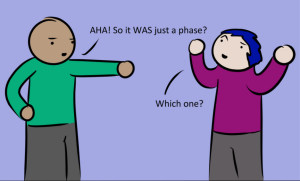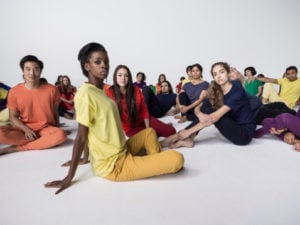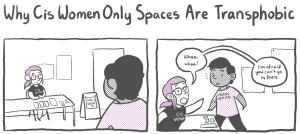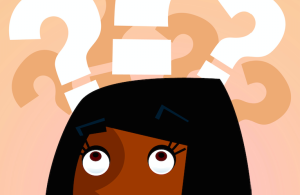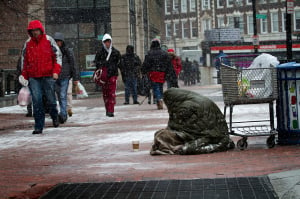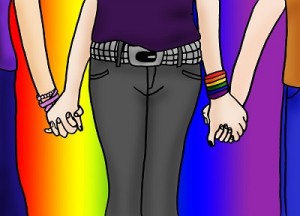
Source: Little Cottage Services
I was 29 when a boyfriend told me it was strange that I didn’t share my food.
“Every time we go out, I have to ask for a taste,” he’d say, “or you simply eat it all without offering me a bite.”
He also remarked that when we would order something to split, he felt he had to eat faster, because if he didn’t, I would eat the entire portion.
At the time, I thought, Why would I want to share my food? I ordered it so I could enjoy it.
My philosophy? What was mine was mine, and yours was yours.
Thinking about it, though, I realized that I kept more than just my peas and carrots to myself. I was also keeping to myself who I was, what I knew, what made me feel good and bad, and on it went.
To share, as defined by Merriam Webster, is simply to let someone else have or use a part of (something that belongs to you).
For years, I wasn’t able to share – because I didn’t know how.
I didn’t know how to let someone have or use only a part of what belonged to me, because I was scared that if I did, I’d lose all of me.
Sharing wasn’t a part of my vocabulary.
But then, little by little, I started asking others if they wanted to try my food. I opened up about my wants and needs. And soon, sharing became a way of authentically connecting not only to others, but also to myself.
As children, we learn how to share our toys and time because it’s not something that we are born knowing. So as adults, since the concept is so driven into us as children, you’d think we’d be more open to sharing. Clearly we know how to do it!
But maybe the reason why we don’t open ourselves up and divulge our experiences is because we can’t see the benefits in doing so.
Sharing, especially good things, is somewhat looked down upon. Like I used to think: What’s mine is mine. But believe it or not, sharing is scientifically proven to boost our personal well-being!
But if that’s not reason enough to start opening up, here are a few more.
1. Sharing Feels Good
By giving away a portion of my food to an ex-boyfriend, I automatically thought about what I was losing in the situation. The same was true for my emotional side.
Every time I opened up, I thought about how I was now more vulnerable than before. Or if I shared something I learned with someone else, I thought of how I may have just given them the advantage they needed to achieve more than me.
A lot of my thought patterns focused on what I was losing.
When we give our time, love, friendship, advice, whatever, what we’re really doing is expressing more of who we are.
So we’re not losing anything – because what’s actually happening is that we’re giving ourselves more of an opportunity to be authentic, which in turn makes us feel better.
Founding director of the Center for Neuroeconomics Studies at Claremont Graduate University, Paul Zak, found that when people share, their brains release the hormone oxytocin, sometimes called the “feel good” or “cuddle” hormone, which relieves stress.
In one study, Zak found that even tweeting and responding to tweets for ten minutes spiked oxytocin levels!
The takeaway? Expressing who we are and connecting with others can improve our well-being.
2. Sharing Makes Us Grateful
There are too many times to count when I’ve had a question that I couldn’t answer or stumbled in front of a parking machine that I couldn’t figure out, when another person offers the information that I need to solve the problem.
It could be as simple as someone giving me a cart in the grocery store or almost sliding my card into an ATM and someone saying “That one’s not working,” or it can be as involved as tech support solving a computer glitch.
The point is: In these moments, I’m extremely grateful for the help.
In her book The Myths of Happiness, Sonja Lyubomirsky points out that “people who regularly practice appreciation or gratitude – who, for example, ‘count their blessings’ once a week over the course of one to twelve consecutive weeks – become reliably happier and healthier.”
That is to say: The more we share, the more gratitude we bring into our lives.
3. Sharing Increases Trust
In grade school, keeping secrets was important.
If someone shared something with me, I knew that if I told someone else the details of that secret, I’d not only hurt a friend who’d confided in me, but I’d also lose their trust.
We choose the people we open up to, and more likely than not, we make that decision based on certain characteristics or attributes. But apart from personal relationships, we put our trust into strangers every day.
When an author contacts me to edit a book and we sign a contract, I trust that at the end of the project, they’ll pay me. In turn, they expect to receive valuable feedback.
If I make a reservation at a restaurant, the establishment trusts that I will show up – and I believe that when I get there, I’ll be seated.
If you think about it, most all of our interactions involve sharing information of some kind.
And by giving of ourselves, we trust not only people we know, but also absolute strangers with our wants and needs.
Imagine what the world would look like if we trusted more people!
If we opened up more to others, they would likely do the same with us.
Sharing gives us the opportunity to shed some of our suspicions of people. It’s a great way to extinguish our doubt about what’s good in the world.
4. Sharing Makes Life Real
When I was accepted into graduate school, the first thing I did was call my parents and then my friends. Similarly, when I’ve started a relationship, got a new job, or decided to move to another country, I’ve immediately shared the news.
When important events happen, whether good or bad, sharing them with others makes them come to life.
When we hold things in and let our thoughts take over, it’s easy to drown in our own words.
The longer we keep what’s happening in our lives inside, the more disconnected we can feel.
Sharing with others gives us the opportunity to celebrate accomplishments, talk through difficult decisions, and to treat our inner dialogue as something of value.
5. Sharing Means You’re Not Alone
When my best friend passed away unexpectedly, what gave me the most comfort, besides crying, was talking.
Sharing stories and listening to others’ stories made the pain subside for a while. And for those who didn’t know my friend, hearing stories of loss they’d experienced or someone simply saying “I’ve been through it, too” was reassuring.
Learning that others had been through similar experiences gave me hope, helping me see that I wasn’t alone.
Because I’m not.
And neither are you.
***
“Connection and sharing is what helps us through our darkest times. Connections heal,” says New York City-based psychotherapist Susan Solomon. “We can take two paths when challenged by life, we can condemn ourselves to isolation or open our hearts, share our pain, and immediately feel better.”
Thinking we can live life without letting others have or use a part of what belongs to us can make us feel isolated, almost like no one in the world cares or could understand.
But when we share with others, what we learn is that we’re actually creating more joy, gratitude, trust, and community – not only for ourselves, but also for the world.
Want to discuss this further? Login to our online forum and start a post! If you’re not already registered as a forum user, please register first here.
Cynthia Kane is a Contributing Writer for Everyday Feminism. Over the last year and a half, she’s relearned the following: how to jump up and down when she’s happy, cry when she’s sad, laugh when something’s funny, take a compliment, smile at strangers, and be open to the fact that everyone is going through it all the time. For more, visit her website or follow her on Twitter @cynkane. Read her articles here.
Search our 3000+ articles!
Read our articles about:
Our online racial justice training
Used by hundreds of universities, non-profits, and businesses.
Click to learn more






